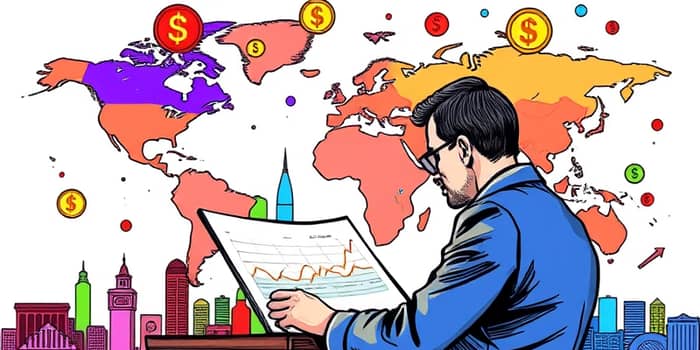In today’s interconnected economy, savvy investors are increasingly looking beyond their borders. By exploring foreign markets, individuals can tap into new growth opportunities and guard against domestic downturns. However, international investing also brings unique challenges that require careful navigation.
Benefits of Investing Across Borders
One of the most compelling reasons to invest internationally is tap into a broader range of companies and industries not found at home. This portfolio diversification helps cushion portfolios against unexpected domestic shocks and opens doors to sectors like technology, natural resources, and consumer goods in emerging regions.
Moreover, many developing economies move at a faster pace than mature markets. By positioning capital in these regions, investors may gain from fast-growing emerging economies with high returns that outpace slower domestic growth.
Countries also often specialize in industries where they hold competitive advantages—whether in agriculture, manufacturing, or cutting-edge research. This specialization in global trade can drive long-term value as local companies innovate and expand.
Key Risks in Global Investing
Despite its appeal, international exposure comes with its own set of hurdles. Perhaps the most unpredictable is exposure to currency exchange rate fluctuations. Changes in foreign exchange rates can amplify gains when the home currency weakens, but they can also erode profits if it strengthens.
Investors must also contend with political and economic instability in some markets. Elections, policy shifts, or sudden regulatory changes can trigger market volatility, sometimes overnight. Regions with less transparent governance may present heightened uncertainty.
In addition, higher transaction costs and legal complexities often accompany cross-border trades. Currency conversion fees, broker commissions, custodian charges, and differing tax regulations can accumulate, impacting net returns over time.
Risk Mitigation Strategies
Mitigating these challenges requires a multi-layered approach. First, adopting an allocation split between developed and emerging markets can limit exposure to any single economy’s turbulence. Second, currency-hedged funds or contracts may shield portfolios from extreme FX movements.
- Investment treaties and bilateral agreements
- Professional guidance from global market experts
- Maintaining adequate liquidity buffers
- comprehensive research on target countries
Beyond financial instruments, investors should conduct thorough due diligence on political stability, economic fundamentals, and local regulations before committing capital.
Investment Vehicles for Global Exposure
There are several pathways to access international markets, each with its own pros and cons. The table below outlines the most common vehicles and their key advantages.
Choosing the right vehicle depends on factors like desired control level, cost sensitivity, and investment horizon. For those seeking simplicity and broad exposure, ETFs or mutual funds may be ideal. Investors desiring precise stock selection might favor direct investments or ADRs.
Final Thoughts and Practical Advice
Global investing offers a powerful way to strengthen portfolios and capture growth beyond domestic borders. By combining a balanced approach to global investing with disciplined risk management, investors can aim for robust returns while limiting downside surprises.
Embarking on this journey demands patience, ongoing education, and vigilant monitoring of international developments. With strategic planning and a focus on long-term goals, the world’s financial markets can become a wellspring of opportunity.
References
- https://www.investopedia.com/investing/pros-cons-foreign-market-investing/
- https://investor.vanguard.com/investor-resources-education/understanding-investment-types/why-invest-internationally
- https://cals.ncsu.edu/news/you-decide-do-international-investments-help-or-harm/
- https://personal.nedbank.co.za/learn/blog/international-investing-pros-and-cons.html
- https://www.investopedia.com/articles/basics/11/biggest-risks-international-investing.asp
- https://www.transnationalmatters.com/risks-in-foreign-direct-investment-how-to-mitigate/
- https://www.investopedia.com/insights/what-is-international-trade/
- https://www.schwab.com/stocks/understand-stocks/international-stocks










